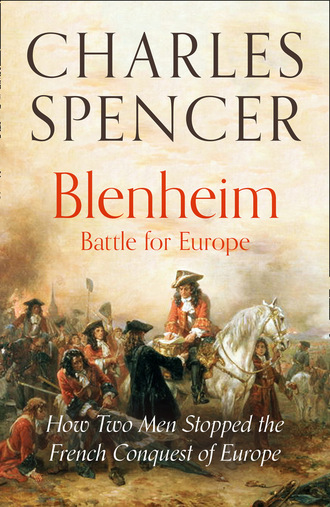
Blenheim: Battle for Europe
The Hanoverian forces had a special reason for joining the Grand Alliance, for their electoral family was in line for the English throne. They were among the first Germans to commit to the cause, providing 10,000 troops before the terms of their involvement were finalised. Their keenness for the fray was further demonstrated when they attacked their neighbours, the princes of Saxe-Gotha and Wolfenbuttel, who had been raising troops for Louis. After Hanover’s intervention, they stood down their forces, and Louis lost the services of 12,000 men.
Self-interest, greed, self-aggrandisement and fear confronted Marlborough as he did William’s diplomatic bidding. No wonder Marlborough called his efforts at this time ‘tormenting’. However, William had chosen his special envoy wisely. Lord Chesterfield, looking back on Marlborough’s career, believed the graciousness that he brought to his diplomatic missions was the key to his overall success: ‘It was by this engaging graceful manner that he was enabled, during all the war, to connect the various and jarring Powers of the Grand Alliance, and to carry them on to the main object of the war, notwithstanding their private and separate jealousies and wrong-headedness. Whatever Court he went on (and he was often obliged to go to restive and refractory ones) he brought them into his measures. The Pensionary Heinsius, who had governed the United Provinces for forty years, was absolutely governed by him. He was always cool, and nobody ever observed the least variation in his countenance; he could refuse more easily than others could grant; and those who went from him the most dissatisfied as to the substance of their business, were yet charmed by his manner, and, as it were, comforted by it.’[fn12] These were the attributes that helped Marlborough to forge the Grand Alliance on William’s behalf: Prussia, Denmark, Sweden, Hanover, Baden, and Hesse-Cassel joined the Imperialists, the Dutch and the English. Between 1701 and 1704 England was to sign fifty treaties and conventions with her allies.
*
William called on his adoptive people to prepare for war. In January 1702, Parliament received one of his more impassioned speeches. He lashed Louis for his presumptuousness, and urged the English to stand up to the threat he represented: ‘I have no doubt that the late proceedings of His Most Christian Majesty and the dangers which threaten all the powers of Europe have excited your most lively resentment. All the world have their eyes fixed upon England; there is still time, she may save her religion and her liberty, but let her profit by every moment, let her arm by land and sea, let her lend her allies all the assistance in her power, and swear to show her enemies, the foes of her religion, her liberty, her government and the king of her choice, all the hatred they deserve!’[fn13]
William died two months afterwards. He broke his collarbone in a fall from his horse, and his physical weakness left him prey to complications, including pneumonia. Incompetent physicians sped his passing. The reactions to the death of Protestantism’s champion was mixed: in England, Jacobites toasted the mole whose molehill had caused William’s mount to stumble; in Holland, consternation was widespread, and church bells were rung thrice a day, in doleful respect; in France, Louis allowed no official mourning, in order not to offend his exiled Stuart protégés at St Germain; but he equally allowed no rejoicing at the death of a respected adversary.
Louis was disappointed if he hoped that England would now revert to isolationism: the new monarch, Queen Anne, rushed to reassure her privy council that vigorous opposition to France, and the stout defence of the Church of England, were her twin priorities. She then wrote to her allies, confirming her readiness for war, and England’s acceptance of a lead role in the coming conflict. In mid-March, she wrote to the Elector Palatine and his son: ‘Therefore in very friendly manner we ask and invite Your Highness and Your Highness Elect to enter into the same Alliance, and to add strength and endurance by your accession. By which act, you will be joining with His Imperial Majesty, with the most high estates of the Dutch Allies, who are very zealous for the Public Good, and especially with Ourselves, who have now solely turned Our attentions, and are about to exert all Our energies, to the end that We may vindicate the common liberty of Europe against the immoderate power of the French.’[fn14] Anne joined her allies in committing to a fight with France on 4 May 1702. When Louis was informed, he quipped: ‘I must be getting old, if ladies are now declaring war on me.’
The new queen enjoyed the full support of her people, but there were unspoken fears that this war was against an invincible enemy. France had not lost a significant land engagement for two generations, during which time Louis XIV’s professional armies had established a reputation for brilliance. However, surely the five years since the Peace of Ryswick had not been long enough for Louis’s forces to regain their pre-1688 strength? The War of the League of Augsburg may have seemed a costly stalemate to the constituents of the first Grand Alliance, but it had pulled some of France’s teeth. William III had fought Louis at his peak: often unsuccessfully, but always with determination. He had blunted the French military machine, imperceptibly but indubitably, and in the process sharpened up the troops under his own control. In particular, as Louis’s armies had begun to wane, English forces were on the rise.
Конец ознакомительного фрагмента.
Текст предоставлен ООО «ЛитРес».
Прочитайте эту книгу целиком, купив полную легальную версию на ЛитРес.
Безопасно оплатить книгу можно банковской картой Visa, MasterCard, Maestro, со счета мобильного телефона, с платежного терминала, в салоне МТС или Связной, через PayPal, WebMoney, Яндекс.Деньги, QIWI Кошелек, бонусными картами или другим удобным Вам способом.





